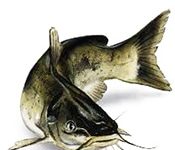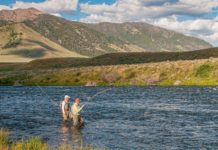Jami Lambrecht/Courtesy photo
For a decade, Summit High School offered a course to students that taught them about stream and river ecology by allowing students to interact with the Blue River, ultimately raising a group of rainbow trout. Though the class is no longer offered at the school, one student took it upon himself to work with his teacher to create an independent study that models the class on a smaller scale.
Landon Cunningham was a freshman at Summit High School when the stream ecology course held its last session. Science teacher Jami Lambrecht had worked with Trout Unlimited to launch the course in 2013, and he taught the class in the years since. Because of the pandemic and changes in the school’s schedule, the course was no longer offered, but Cunningham showed an interest in maintaining the trout tanks and wanted to partake in something similar to the now-defunct course.
Cunningham, who already had a passion for fly fishing, approached Lambrecht about doing an independent study, and the pair worked together to tweak the curriculum, which received final approval from the school board.
Cunningham’s study launched during the fourth quarter of the school year. He is still preparing and organizing all of the equipment in the school’s wet lab where the tanks are kept. Eventually, Trout Unlimited will send the rainbow trout eggs to the school, making Cunningham responsible for raising them and testing the water’s chemistry to make sure it’s adequate for the fish, all of which is done under the supervision of Lambrecht.
At the end of the quarter, the duo will release the fish into a private pond or tank. In the formal course, students would test to make sure the fish do not have any pathogens to ensure they were safe to release in the Blue River. The tests cost $30 each, so to save on expenses for Cunningham’s study, the pair is searching for an isolated body of water to put the 20 to 25 fish at the end of the school year.
Cunningham said the course is growing his passion for the outdoors and that it even has him thinking about what field he will pursue in college.
“I’ve fly fished throughout my whole life. I grew up fly fishing, my dad has grown up fly fishing, so it’s one of my passions, as well. To be able to have an outlet to continue that and continue those pursuits just is really enticing to me,” Cunningham said.
Lambrecht, who also has a passion for river ecology and fly fishing, said the class is important in teaching students about the world around them and especially about Summit County’s environment.
“It gives you a living component to the ecosystem that you can go out and appreciate and eventually motivate you to maybe learn more about it so you can eventually protect it,” Lambrecht said. “It also puts you in contact with an entity like (Colorado) Parks and Wildlife and Trout Unlimited – like the (U.S.) Forest Service.”
Trout Unlimited has helped support the class financially and continues to do so by donating the trout eggs. Slifer Smith & Frampton Real Estate has also provided a grant to for equipment, and Mountain Angler in Breckenridge provides a small scholarship eligible to students who have gone through the program in order to pursue conservation in college.
Greg Hardy, Silverthorne resident and vice president of Colorado Trout Unlimited, said the organization continues to be involved in supporting the course because of the kind of impact it has on students.
“Some of the students in the high school know a lot, and a lot of times it has to do with their family, whether their parents — one or both of them — are outdoors people and get out and get them in the water or teach them about the watershed. But some of them aren’t that fortunate,” Hardy said. “Living in Summit, we have a great opportunity to be able to teach students about conservation and about how a river life cycle actually works.”
Credit: Source link






























